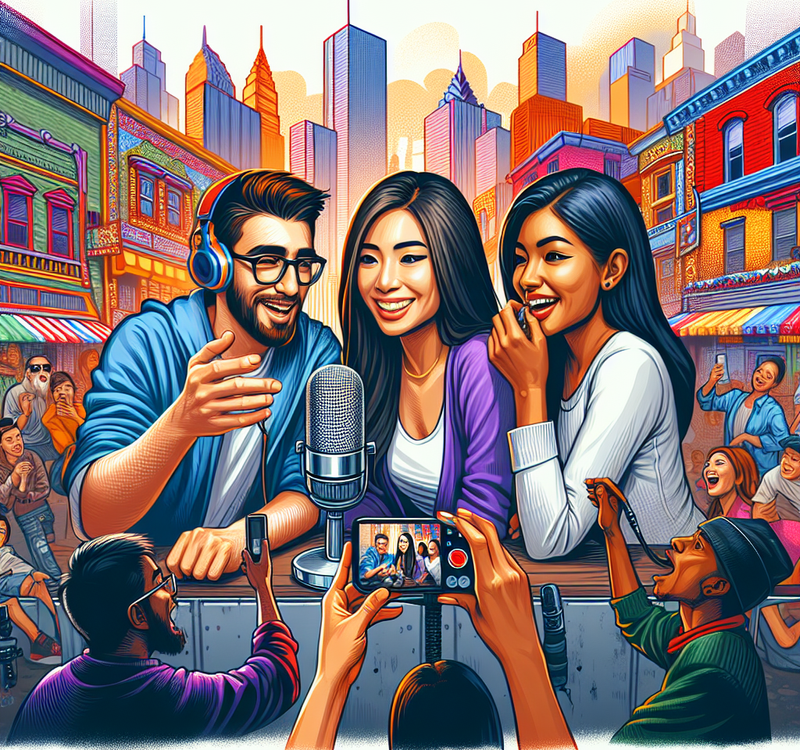The Ultimate Guide to Maximizing Online Marketing Budget with Influencers on Platforms like Google and Facebook
30 September، 2023
Beware of Deception: Unveiling the Dark Side of Micro Influencers and Fake Followers
30 September، 2023The Power of Fashion and Style Influencers: How They Can Transform Your Marketing Strategy

How is marketing strategy shaped by influencers?
In today's digital age, influencers have become a powerful force in shaping marketing strategies. Influencer marketing is a strategy that involves partnering with influential individuals on social media platforms to promote products or services. By leveraging the popularity and influence of these individuals, brands can reach a wider audience and build trust and credibility with their target market.
Influencer marketing has changed the way brands approach their marketing strategies. Instead of relying solely on traditional forms of advertising, such as television commercials or print advertisements, brands are now incorporating influencer partnerships into their overall marketing plans.
Fashion brands, in particular, have embraced influencer marketing as a way to connect with their customers in a more authentic and relatable way. By partnering with fashion influencers, brands can tap into the influencers' engaged social media following and leverage their influence to promote their products.
Fashion influencers have established themselves as authorities in the fashion realm by sharing their personal styles, fashion tips, and product recommendations with their followers. Their relatability and authenticity foster trust and loyalty among their audience, making them valuable partners for fashion brands.
Influencer marketing has also led to a shift in how brands position themselves in the market. Instead of solely focusing on promoting the features and benefits of their products, brands are now looking to align themselves with the lifestyles and values of their target audience. By partnering with influencers who embody their brand values, fashion brands can establish a deeper connection with their customers.
Furthermore, influencer marketing has transformed the way fashion brands approach their advertising campaigns. Instead of relying on supermodels or celebrities, brands are now using real people to showcase their products. This shift allows brands to position themselves as accessible and relatable, which resonates with consumers in today's social media-driven world.
Overall, influencers play a crucial role in shaping marketing strategies for fashion brands. They offer a new way to connect with potential customers and provide a more authentic and relatable approach to advertising. By leveraging the power of influencers, fashion brands can transform their marketing strategies and reach their target audience in a more impactful way.
How does fashion influence marketing?
Fashion has a significant influence on marketing strategies, particularly in the context of influencer marketing. Fashion trends and styles can shape the way brands market their products and connect with their target audience.
Fashion is an ever-evolving industry. With new trends constantly emerging, brands need to stay on top of these trends to remain relevant and appealing to their customers. By incorporating current fashion trends into their marketing strategies, brands can establish themselves as trendsetters and create a sense of excitement and urgency among their audience.
In influencer marketing, fashion plays a crucial role in how brands position themselves and the types of influencers they partner with. By aligning themselves with influencers who embody current fashion trends, brands can tap into the influencers' fashion-forward style and appeal to their audience.
Fashion also influences the types of content that brands create for their marketing campaigns. For example, brands may create lookbooks or style guides that showcase how their products can be styled in different ways. By providing fashion inspiration and showing how their products can be incorporated into the latest trends, brands can connect with their audience on a deeper level.
In addition, fashion can impact the visual aesthetics of a brand's marketing materials. From the colors and fonts used in advertisements to the overall brand identity, fashion can shape the way brands present themselves to their target audience.
Overall, fashion has a significant impact on marketing strategies. It shapes the way brands position themselves, the influencers they partner with, and the types of content they create. By staying on top of fashion trends and incorporating them into their marketing strategies, brands can establish themselves as industry leaders and connect with their audience in a more meaningful way.
How influencer marketing has changed marketing?
Influencer marketing has revolutionized the way brands approach their marketing strategies. It has changed traditional marketing methods and opened up new opportunities for brands to connect with their target audience.
One major way that influencer marketing has changed marketing is by shifting the focus from traditional advertising to more authentic and relatable content. Influencers have built large and engaged followings by sharing their personal experiences, lifestyles, and recommendations with their audience. Brands have recognized the value in partnering with these influencers to promote their products or services.
Influencer marketing has also given rise to the concept of micro-influencers. These are influencers who have a smaller following but are highly influential within a specific niche or community. Brands have realized that partnering with micro-influencers can be just as effective, if not more, as partnering with larger influencers. This has allowed brands to target niche markets and connect with a more targeted audience.
Another way influencer marketing has changed marketing is by leveraging the power of social media. Social media platforms, such as Instagram, YouTube, and TikTok, have become the go-to platforms for influencer marketing campaigns. Brands can reach a wide audience through these platforms and tap into the influencers' engaged following.
Influencer marketing has also led to a shift in how brands measure the success of their marketing campaigns. Traditional metrics, such as impressions or reach, are no longer the sole indicators of success. Brands now look at engagement metrics, such as likes, comments, and shares, to gauge the effectiveness of their influencer partnerships. This shift highlights the importance of building genuine connections with the audience and creating meaningful content.
Overall, influencer marketing has changed the landscape of marketing. It has shifted the focus to authenticity and relatability, opened up opportunities for niche targeting, and highlighted the importance of engagement. Brands now see the value in partnering with influencers to reach their target audience in a more meaningful and impactful way.
How are influencers influencing fashion?
Influencers have become a driving force in shaping the fashion industry. They have revolutionized the way fashion trends are created, disseminated, and adopted by consumers. By sharing their personal styles, fashion tips, and product recommendations, influencers have formed deeper connections with their audience compared to traditional media outlets.
One way influencers are influencing fashion is by challenging traditional marketing strategies. Instead of relying solely on traditional forms of advertising and celebrity endorsements, brands are now turning to influencers to promote their products. Influencers provide a more organic and immersive approach, seamlessly integrating branded products into their posts, stories, and videos. This type of marketing feels natural and non-intrusive, allowing brands to effectively reach their target audience.
Furthermore, influencers act as trendsetters and tastemakers within the fashion industry. Their outfits, collaborations, and personal style choices become sources of inspiration for millions of followers. By showcasing these trends, influencers have the power to influence and shape the fashion landscape.
Influencers also play a significant role in reshaping the relationship between brands and consumers. Their relatability and authenticity foster trust and loyalty among their audience, making them valuable sources of fashion information. Consumers look to influencers for fashion inspiration, advice on styling outfits, and recommendations on the latest fashion products.
Additionally, influencers have brought diversity and inclusivity to the fashion industry. They represent different body types, ethnicities, and styles, breaking the traditional mold of fashion advertising. This inclusivity has resonated with consumers and has influenced the way brands approach their marketing and product offerings.
Overall, influencers have transformed the fashion industry by captivating and influencing millions of followers. They have challenged traditional marketing strategies, introduced a consumer-driven trend era, and reshaped the relationship between brands and consumers. Influencers have become crucial figures in shaping fashion trends and preferences, and their influence shows no signs of slowing down.



